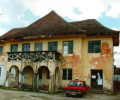Victim/Witness Counselling and Legal Representation: a Model of Support – Project implementation report
In the period following the toppling of Slobodan Milošević, the transitional government supported domestic war crimes trials, but it soon became clear that serious impediments existed. Police was not willing to share its data on war crimes perpetrators with prosecutors, primarily because most of them belonged to the police. On the other hand, prosecutors and judges were not able to secure victims’ participation in war crimes trials because of their mistrust in Serbian institutions.
In a situation like that, and having in mind the fact that the organization was trusted by victims from all parts of the former Yugoslavia, the Humanitarian Law Center (HLC) accepted the challenge of taking direct part in war crimes trials in order to help bring justice to victims and establish accountability of perpetrators. In such a context, HLC began acting as victims’ legal representative and started encouraging victims of war crimes to take part in trials. The first such trial in which HLC represented war crimes victims (Sjeverin Case) showed that victim participation was critically important to determine accountability of the accused and acknowledge crimes committed against the victims. Legal representation proved to be very important also because of attempts of prosecutors and the defense of the accused to hide or misinterpret facts regarding Serbian institution’s role (police and the military) in armed conflicts on the territory of the former Yugoslavia. In a case known as Podujevo Case HLC managed to convince surviving victims of the Podujevo (Kosovo) massacre to testify before a court in Serbia and also managed to secure a witness/insider, who, in the presence of surviving Albanian children, testified about the murder of their mothers, killed by members of the Scorpions unit, to which he himself belonged.







